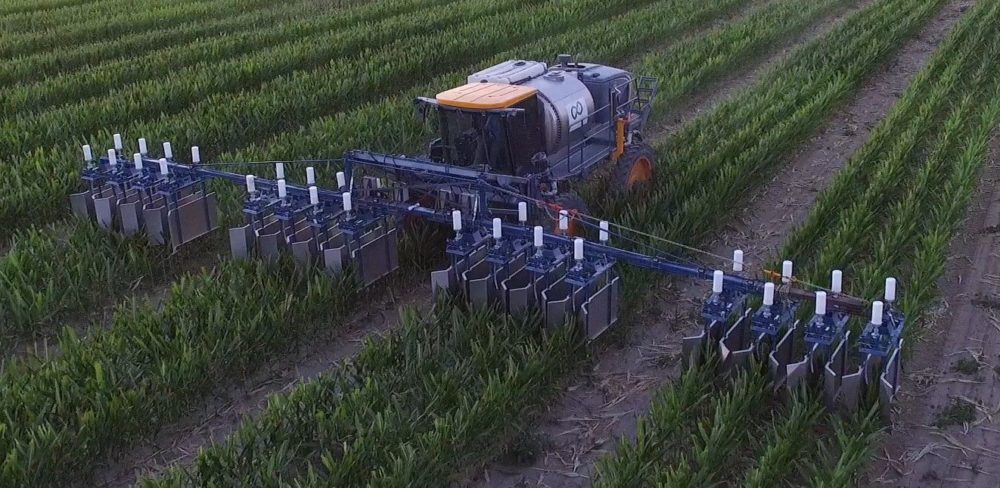“If you build it; the funding will come.”
It might not be the exact quote that drove Kevin Costner to build a baseball diamond in an Iowa cornfield in Field of Dreams, but it is the advice that many founders and entrepreneurs are following as they look for locations for their agtech startup businesses.
Businesses located in Iowa are finding the combination of the state’s growing startup ecosystem, proximity to customers and global agricultural leadership, lower operating costs, and an expanding base of strategic and capital funding are giving startups an advantage that even the Silicon Valley can’t provide.
Here three founders shared their experiences in building and commercializing their businesses in America’s Cultivation Corridor, attracting investors and partners, and successfully completing, deals and acquisitions.
Smart Ag
Smart Ag was founded in early 2016 with a goal of addressing the ongoing challenge of labor scarcity for row crop farmers by bringing together the fast-advancing technologies of automation and precision agriculture.
“The goal from the beginning was to provide a platform to automate agricultural vehicles, then apply it to various jobs that are done in the field,” said Colin Hurd, founder of Smart Ag. “We started with addressing the grain cart operator job during harvest, which led to the development of AutoCart.
Hurd is an Iowa native who founded Smart Ag after the successful development and exit of another ag startup business, Agricultural Concepts. He was named to the 2019 Forbes 30 Under 30 list.
“The number one reason we located in Iowa was the proximity to our customer base and the state’s ag resources. Technology drives our product, but most importantly, we are connecting technology to our customers in a meaningful way,” said Hurd. “We were able to develop our product alongside corn and soybean farmers, working on solutions from grain cart tractors and writing code from combine cabs.”
The Smart Ag team gathered feedback from farmers at every step of the research and development process. The increasing amount of resources available to startups in the Corridor were a convincing factor for Hurd to locate Smart Ag in Iowa.
“We were able to secure support from programs like ISU Startup Factory, Ag Startup Engine and the associated investors and mentors in those programs, and were able to attract the talent we needed to come to Iowa,” said Hurd.
“The funding and supporting resources in Iowa have improved over the past five to 10 years; we’re seeing more angel groups, more strategic investors that are making startup investments part of their overall strategy, whether that is independently or through funds,” he said. “As Iowa’s track record continues to be good, we’ll see more and more funds and resources interested in businesses here.”
Smart Ag was acquired by Raven Industries in November 2019, with plans to continue growth and product development. Over the last three years, the company has released systems across the country, enabling completely driverless operation of machinery to improve harvest labor efficiency.
“No startup makes sense unless you are connected to the problem. Don’t prioritize your location where the funds are but prioritize where the problem is that you are trying to solve; then go out and find the resources to solve the problem,” said Hurd.
Performance Livestock Analytics
Dane Kuper grew up on an Iowa farm and attended Iowa State University. Early in his career, he had the opportunity to work with an early stage startup in San Francisco that became Climate Corp.
When Kuper and his co-founder Dustin Balsley decided to start the business that would become Performance Livestock Analytics, they were confident it could be built in Iowa, but some people in their networks said it needed to be located on the West Coast.
“It has been interesting and amazing. The amount of resources available in Iowa have amazed me every step of the way,” said Kuper. “In Iowa, we are also able to be very capital-efficient. We could build and go to market with a revenue-generating platform without taking on the amount of debt that would have been necessary in Silicon Valley. The overhead we carried from day one is 10 times less in Iowa than what would be required in California.”
Kuper and Balsley’s focus on the livestock industry was driven by the gap they saw between technology availability and adoption in row crops compared to livestock. Performance Livestock Analytics provides a digital platform for beef producers to manage their data and make business decisions, including tracking of feed inventories, cattle performance data, closeouts, input management and more.
“While row crop businesses were digitized and had precision tools, the multi-million-dollar livestock sector was still managed largely with pen and paper,” Kuper said. “We located in Iowa because our addressable market was here – livestock are raised up and down the Midwest, so it just made sense.”
Capital efficiency, including a location at the ISU Research Park in Ames, and ability to tap into talented students at Iowa State University, were a significant advantage for the startup.
“As a startup, we also worked through the Ag Entrepreneurship Initiative (AgEI) at Iowa State University and could hire ISU interns that were co-funded through the AgEI program,” said Kupers.
Performance Livestock Analytics raised capital through a combination of contacts from their networks on the West Coast, and a mix of new investors and strategic funders from the Midwest.
“There may be the misperception that you have to be located on the West Coast to attract attention from West Coast investors,” said Kuper. “However, we’re seeing more people building where it makes sense to build, then looking for capital as they need it. And, more West Coast-based capital is looking for high growth, capital efficient businesses regardless of location.”
Performance Livestock Analytics was acquired by Zoetis in April 2020. They remain headquartered at ISU Research Park in Ames.
“From Day One, the beef industry took hold of the idea to connect the supply chain that had been largely offline; as we looked at taking the next step and evaluating the next round of funding, we were approached by several strategic partners,” said Kuper. “With Zoetis, we found the perfect alignment of mission, culture and strategic vision for animal health.”
PowerPollen
PowerPollen is an Ankeny, Iowa, based startup that focuses on more precise and efficient pollination to boost yield and quality in seed corn production. The company’s technology is the first of its kind to successfully collect corn pollen, store it, then apply it to the corn plants at the proper time and proper place to overcome the inefficiencies in natural processes. With increased flexibility, on-demand pollination technology can increase yield by 20% or more than today’s standard seed practices.
Co-founders Todd Krone and Jason Cope brought their experience from careers in the seed industry to the startup, beginning work in Krone’s garage in Ankeny, Iowa, in 2015. They immediately tapped into the network of startup and entrepreneur resources available in America’s Cultivation Corridor, including Iowa Economic Development Authority.
In 2018, PowerPollen scaled its pollen collection, preservation and application process, expanding field operations using custom designed machinery across in-field production. The following year, they applied the technology at eight different seed production centers across Iowa, Indiana and Illinois. This one-of-a-kind machinery was developed in partnership with an Iowa-based seed equipment manufacturer. Today, the company has grown to include office, laboratory and greenhouse space in Ankeny, with more than 20 employees.
“They say that farmers have 40 growing seasons in a lifetime. As a startup, you can’t miss those growing season opportunities, either,” said Krone. “It is critical to be located where you can work directly with farmers in their fields, innovate quickly and take advantage of every growing season.”
Krone said that a location in the heart of the Corn Belt was critical, because nearly every seed company that was a potential customer is also located there. It also enabled proof of concept and scaling. Many of the company’s early angel investors and early-stage investors were Iowa-based, including Iowa Corn Growers Association, Syngenta, and Ames Seed Capital Fund. PowerPollen signed a commercial agreement with Corteva Agriscience in April 2020, which Krone said has led to more interest from funders and potential customers. PowerPollen aims to expand its technology to other commodity crops, such as wheat and rice, as well as solutions for individual farmers.
“For the first several years, the most important thing for PowerPollen was access to potential customers, smart money, talent, and people who could advise us. We were really able to prove our technology and grow faster than we could anywhere else,” said Krone. “While Iowa is at the heart of U.S. agriculture, it is also very connected to global leaders such as Brazil, China and key European countries.”
The experiences of SmartAg, Performance Livestock Analytics and PowerPollen are just a few examples of startups and early stage companies building a foundation for growth with roots in America’s Cultivation Corridor.
“Iowa is uniquely positioned to meet the needs of ag and bioscience startups by providing an environment that nurtures innovation and connections among customers, partners and funders,” said Debi Durham, director of the Iowa Economic Development Authority and the Iowa Finance Authority.
“We’ve seen tremendous growth and success for Iowa entrepreneurs in recent years and have built the foundation for that growth to accelerate quickly in the years ahead.”





